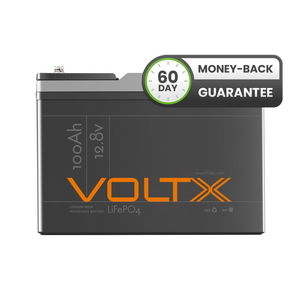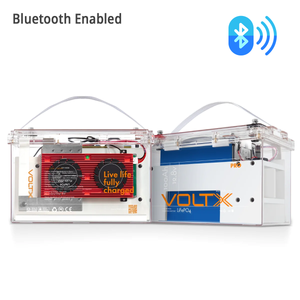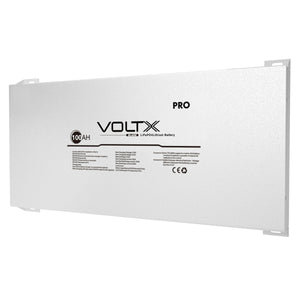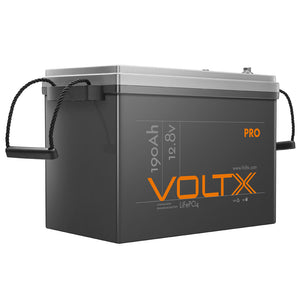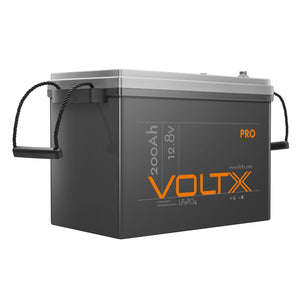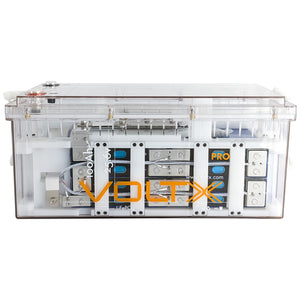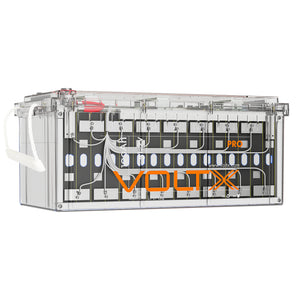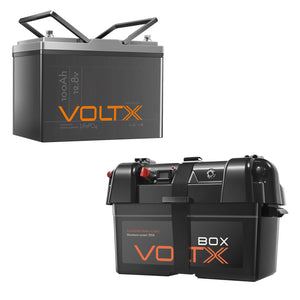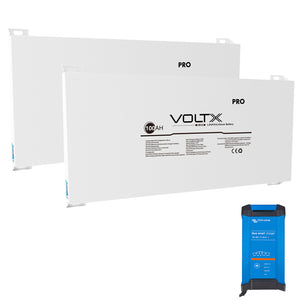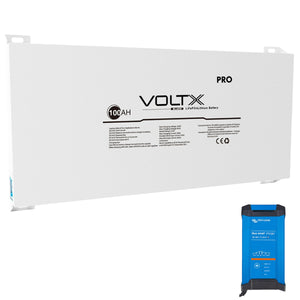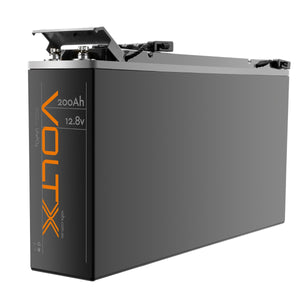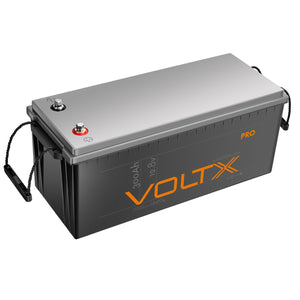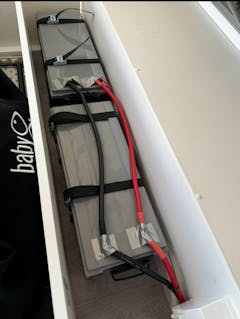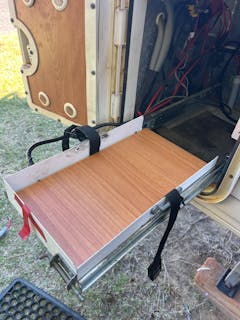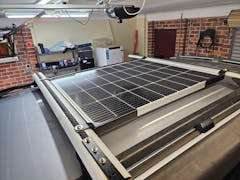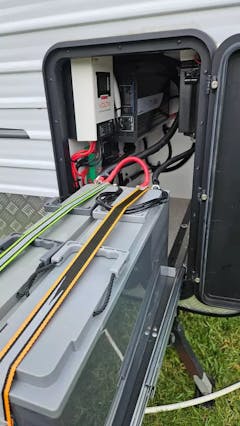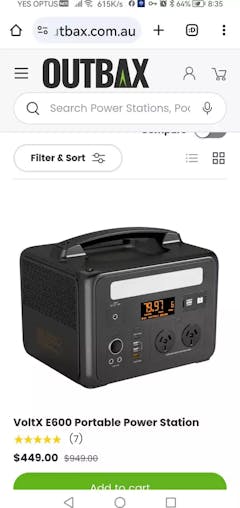BUNDLE DEAL - Victron Smart IP22 SLA + 2* VoltX 12V 100Ah Blade Lithium Battery
$2,199.00Unit price /UnavailableVery low stockBUNDLE DEAL - Victron Smart IP22 SLA + VoltX 12V 100Ah Blade Lithium Battery
$1,249.00Unit price /UnavailableVery low stock
Guide to LiFePO4 Battery Technology
Did you know that the right battery can revolutionise your off-grid experiences, offering power that lasts significantly longer and is safer than older technologies? The modern LiFePO4 battery represents a game-changer for reliable energy across countless applications, from weekend camping trips to permanent off-grid installations. This comprehensive guide explores everything you need to know about these advanced power solutions, from their unique chemistry to selecting the perfect model for your specific needs. Understanding LiFePO4 technology will help you make an informed decision that pays dividends for years to come.
Understanding LiFePO4 Batteries: The Basics
Lithium iron phosphate battery technology, commonly abbreviated as LiFePO4 or LFP battery, represents a distinct category within the broader lithium ion battery family that's rapidly becoming the gold standard for deep-cycle applications. At its core, this battery chemistry utilises lithium iron phosphate as the cathode material, creating an inherently stable power source that sets it apart from other lithium variants. The absence of cobalt in these batteries isn't just a technical detail—it's a crucial ethical and environmental differentiator that makes them a more sustainable choice for conscious consumers. This unique chemical composition delivers exceptional thermal and chemical stability, addressing many of the safety concerns associated with earlier battery technologies while maintaining the high performance that modern applications demand.
Why Choose a LiFePO4 Battery: Key Advantages
The compelling advantages of LiFePO4 battery technology extend far beyond simple power storage, offering a comprehensive solution that addresses virtually every limitation of traditional batteries. These long lifespan batteries deliver an impressive 3,000 to 8,000+ charge cycles, translating to 10-15 years of reliable service—a stark contrast to the 2-3 year lifespan of comparable lead-acid batteries. The enhanced safety profile stems from their exceptional thermal stability, virtually eliminating risks of thermal runaway, overheating, or combustion whilst producing no harmful gases during operation.
Performance-wise, these high-efficiency power solutions offer over 95% depth of discharge capability, maintain a remarkably low self-discharge rate of just 2-3% per month, and deliver consistent power throughout their discharge cycle. The lightweight battery design, typically 50-70% lighter than lead-acid equivalents, revolutionises portable applications for caravans and marine use. As an eco-friendly power option, these batteries contain no toxic heavy metals like lead, cadmium, or cobalt, and offer excellent recyclability at end-of-life, making them an environmentally responsible choice for sustainable energy storage.
Selecting Your Ideal LiFePO4 Battery: Key Considerations
Choosing the right 12V lithium battery or higher voltage option requires careful consideration of your specific power requirements and system configuration. Voltage selection forms the foundation of your decision, with 12V systems being ideal for caravans and camping applications, whilst 24V configurations suit larger marine installations, and 48V options excel in substantial off-grid solar setups. VoltX offers comprehensive options, including the popular VoltX 12V 100Ah LiFePO4 Battery and higher voltage alternatives like the VoltX 24V 100Ah Pro or VoltX 48V 100Ah Pro models. Determining your capacity needs involves understanding amp-hour (Ah) ratings and how they translate to real-world runtime, with popular capacities like 100Ah lithium battery, 200Ah lithium battery, and 300Ah lithium battery options catering to different energy demands.
For extended trips or higher power requirements, models like the VoltX 12V 200Ah Pro or VoltX 12V 300Ah Pro provide substantial energy reserves. Physical constraints often dictate battery selection, making slim lithium battery designs particularly valuable for space-limited installations, with options like the VoltX 12V 100Ah Slim Blade or VoltX 12V 200Ah Slim Battery fitting perfectly in tight spaces.
Advanced features enhance functionality significantly, including sophisticated Battery Management Systems for protection and longevity, Bluetooth connectivity for remote monitoring as found in the VoltX 12V 100Ah Bluetooth Daly model, and series/parallel connection capabilities in VoltX Pro models for building larger battery banks.
Unpacking Key LiFePO4 Features: The Tech Explained
The advanced BMS (Battery Management System) serves as the brain of every quality LiFePO4 battery, orchestrating protection against overcharge, over-discharge, over-current, temperature extremes, and cell imbalances to ensure both safety and maximum lifespan. Pro series models like the VoltX 12V 190Ah Pro incorporate enhanced BMS technology for superior battery protection and performance optimisation.
Proper charging requires understanding that LiFePO4 batteries have specific voltage and current requirements, making a dedicated lithium battery charger at 12V or an appropriate voltage essential for optimal performance and longevity.
These specialised chargers ensure correct charging profiles whilst maintaining compatibility with quality solar charge controllers for renewable energy applications. The deep discharge capability of LiFePO4 technology truly shines when compared to traditional batteries, as these units can be regularly discharged to 95% or more of their capacity without significant lifespan reduction, unlike lead-acid batteries that suffer permanent damage when discharged below 50%. This combination of intelligent protection, proper charging, and deep cycling capability creates a robust energy storage solution that maximises both performance and longevity.
LiFePO4 Batteries: Powering Diverse Applications
The versatility of deep cycle lithium battery technology shines across numerous applications, each benefiting from the unique advantages these power solutions provide. For caravan and camping enthusiasts, the lightweight design and extended runtime make models like the VoltX 12V 100Ah or the space-saving VoltX 12V 200Ah Slim ideal for powering lights, fridges, and electronics during off-grid adventures. Marine applications demand vibration resistance and absolute safety, making Pro series options like the VoltX 12V 300Ah Pro or VoltX 24V 100Ah Pro perfect for demanding boating environments where reliability is paramount.
Solar energy systems particularly benefit from LiFePO4 solar battery technology due to exceptional efficiency and cycling capability, with higher capacity models like the Outbax VoltX 48V 100Ah Pro excelling in comprehensive off-grid installations. Space-constrained applications find perfect solutions in Slim and Slim Blade designs, while emergency backup systems capitalise on the long shelf life and instant power delivery of models like the VoltX 24V 100Ah Pro or VoltX 48V 100Ah Pro, ensuring critical systems remain operational when needed most.
Making the Switch: Is a LiFePO4 Battery Worth It?
The total cost of ownership analysis reveals that while a standard 100Ah LiFePO4 like the VoltX model, starting from $899 represents a higher initial investment than traditional batteries, the 6-10 times longer lifespan often results in significant long-term savings through reduced replacement frequency and higher operational efficiency. Beyond the financial benefits, the peace of mind provided by superior safety features and unwavering reliability adds immeasurable value, particularly in critical applications where battery failure could have serious consequences.
By choosing LiFePO4 technology, you're future-proofing your power needs with a modern, forward-thinking investment that aligns with evolving energy requirements and environmental consciousness. The combination of extended lifespan, enhanced safety, superior performance, and long-term cost-effectiveness makes the switch to LiFePO4 a sound decision for anyone serious about reliable, sustainable power storage.
Final Thoughts on Energising Your Setup
The transition to LiFePO4 battery technology represents more than just an upgrade—it's a fundamental shift towards more reliable, efficient, and sustainable power solutions. With their exceptional longevity, unmatched safety profile, impressive efficiency, and remarkable versatility, these batteries have redefined what's possible in portable and stationary energy storage. Selecting the right
LiFePO4 battery ultimately depends on your specific power requirements, application demands, and system configuration, but the long-term benefits remain consistent across all use cases. As you assess your energy needs and consider your options, remember that investing in quality LiFePO4 technology today means enjoying reliable power for years to come. Take the time to evaluate your requirements carefully and discover how the right LiFePO4 battery can transform your power setup into a dependable, efficient system that meets your needs now and well into the future.
Frequently Asked Questions
-
What is a LiFePO4 battery, and how is it different from other lithium batteries?
LiFePO4 (Lithium Iron Phosphate) batteries use iron phosphate as the cathode material, offering superior safety and lifespan compared to other lithium-ion types like NMC or NCA. While some lithium batteries have a higher energy density, LiFePO4 excels in stability, longevity, and safety, making it ideal for applications where reliability matters most. The absence of cobalt also makes them more environmentally friendly and ethically sourced.
-
How long does a LiFePO4 battery typically last?
A quality LiFePO4 battery typically delivers 3,000 to 8,000+ deep charge cycles, often translating to 10-15 years or more of service depending on usage patterns. This exceptional lifespan represents a six to ten-fold improvement over traditional lead-acid batteries, making them an excellent long-term investment despite higher initial costs.
-
Are LiFePO4 batteries safe to use?
Yes, LiFePO4 batteries are considered one of the safest lithium-ion chemistries available due to their exceptional thermal and chemical stability. They're significantly less prone to thermal runaway than other battery types, don't produce harmful gases during operation, and include sophisticated protection systems to prevent overcharging, over-discharging, and other potentially dangerous conditions.
-
Can I use my old lead-acid battery charger for a LiFePO4 battery?
Generally, no—it's highly recommended to use a charger specifically designed for LiFePO4 chemistry. These batteries require different charging voltages and profiles than lead-acid batteries, and using an incompatible charger could result in incomplete charging, reduced lifespan, or potential safety issues. Investing in a proper LiFePO4 charger ensures optimal performance and longevity.
-
What are the main advantages of LiFePO4 over lead-acid batteries?
LiFePO4 batteries offer numerous advantages, including 6-10 times longer lifespan, 50-70% weight reduction, higher efficiency with over 95% usable capacity, superior safety without acid or gas emissions, deeper discharge capability without damage, and consistent power delivery throughout the discharge cycle. These benefits typically offset the higher initial investment through reduced replacement costs and improved performance.
-
What does Ah mean on a battery?
Ah stands for Amp-hours, a measure of battery capacity indicating how much current a battery can deliver over time. For example, a 100Ah battery can theoretically provide 100 amps for one hour, 10 amps for 10 hours, or 5 amps for 20 hours. Higher Ah ratings mean more energy storage capacity and longer runtime between charges.
-
What are common applications for LiFePO4 batteries?
LiFePO4 batteries excel in diverse applications, including caravans and RVs, marine and boating systems, solar energy storage, off-grid power installations, electric vehicles, emergency backup power, and portable power solutions. Their combination of safety, longevity, and performance makes them suitable for virtually any deep cycle application where reliable power is essential.
-
Are there any disadvantages to LiFePO4 batteries?
The primary disadvantage is higher upfront cost compared to traditional batteries, though this is typically offset by longer lifespan and superior performance. They also have specific charging requirements and slightly lower energy density than some other lithium types. However, for most deep-cycle applications, the benefits far outweigh these minor limitations.
Frequently Asked Questions
- How long does a LiFePO4 battery typically last?
- Are LiFePO4 batteries safe to use?
- Can I use my old lead-acid battery charger for a LiFePO4 battery?
- What are the main advantages of LiFePO4 over lead-acid batteries?
- What does Ah mean on a battery?
- What are common applications for LiFePO4 batteries?
- Are there any disadvantages to LiFePO4 batteries?
